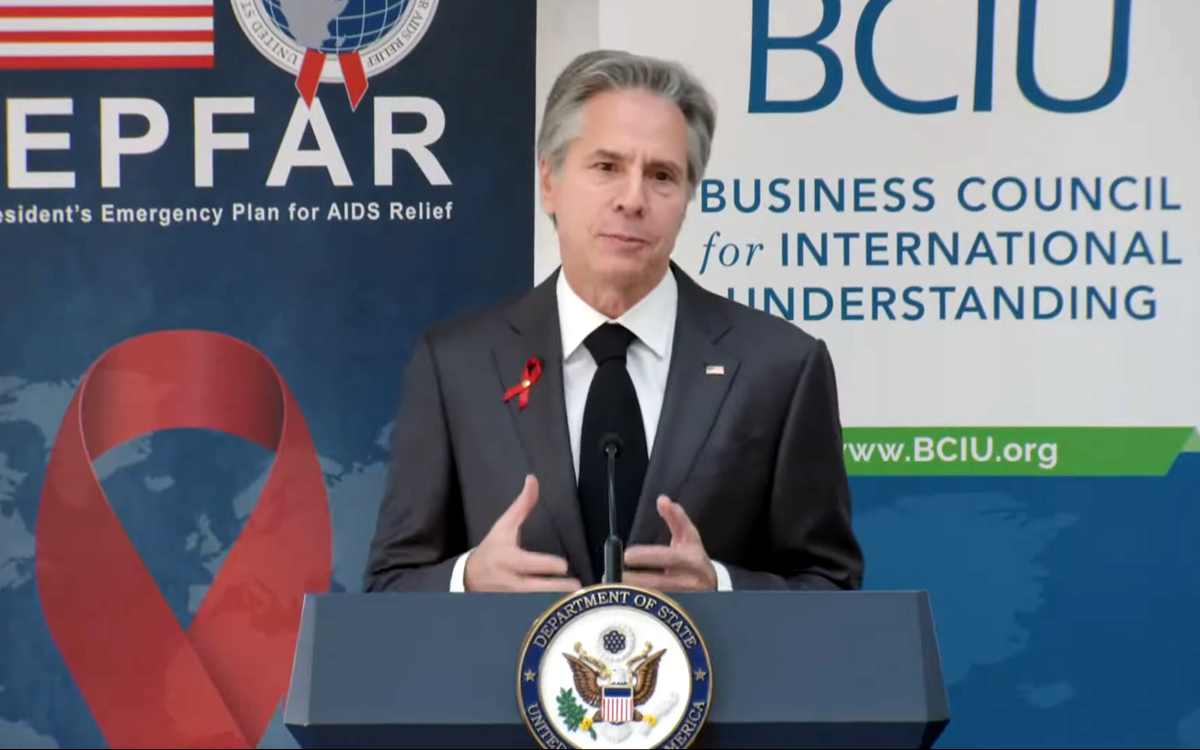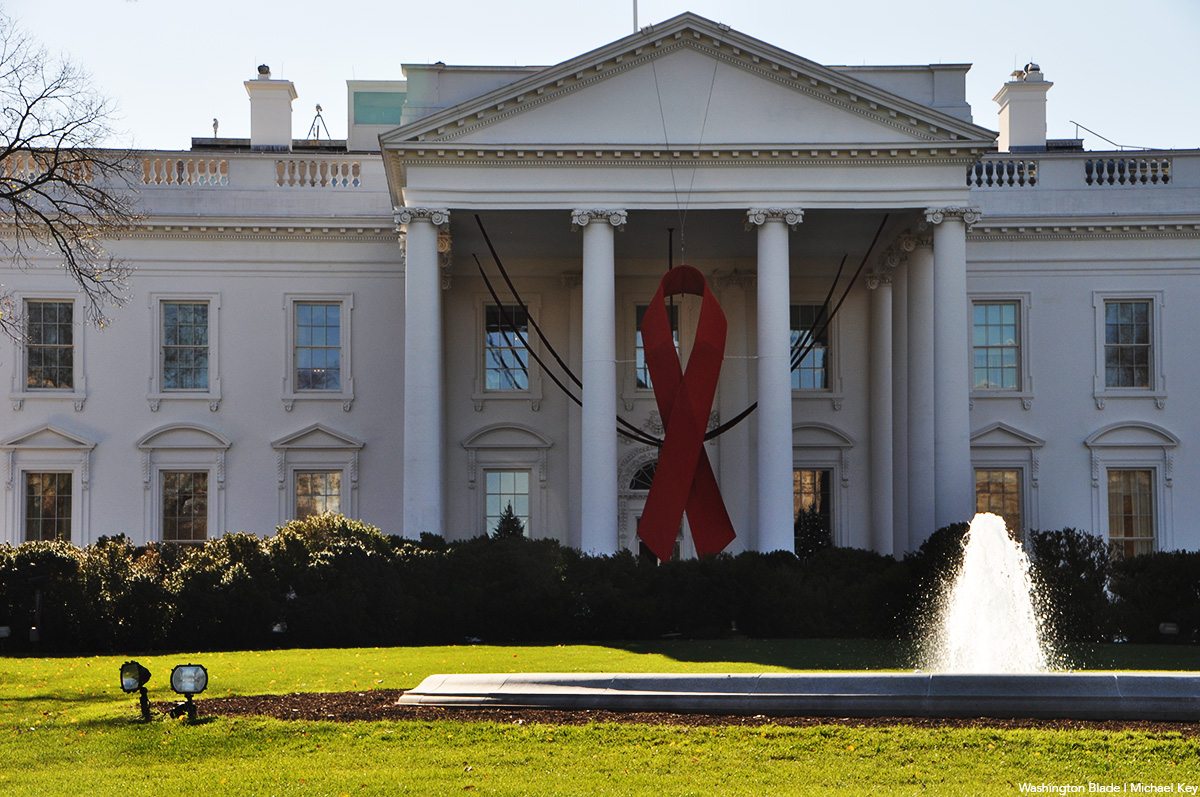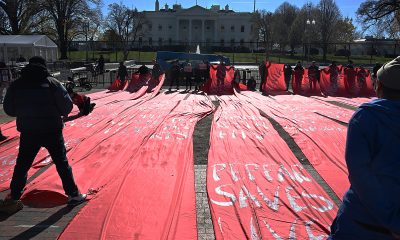State Department
U.S. officials postpone Uganda PEPFAR meeting
April 25 letter cites need to assess Anti-Homosexuality Act impacts

American officials have postponed a meeting on the President’s Emergency Plan for AIDS Relief’s work in Uganda in order to assess the potential impact the country’s Anti-Homosexuality Act will have on it.
Uganda PEPFAR Country Coordinator Mary Borgman on April 25 sent a letter to the PEPFAR Uganda Country Operational Plan 2023 on behalf of Amb. John Nkengasong, the U.S. Global AIDS Coordinator and Special Representative for Health Diplomacy who oversees PEPFAR.
“I want to thank you for your diligent efforts during the past several weeks for developing the Uganda COP23 plans in a highly complex and shifting landscape,” said Nkengasong in the letter.
“In light of the recent developments with the potential signing of the Anti-Homosexuality Act (AHA) and how that could impact our ability to provide services and assistance, I have made the decision to postpone the Final COP Presentation meeting previously scheduled for April 28,” he wrote. “This postponement will allow us more time to collectively and effectively assess the legal and programmatic implications of the evolving legislation and broder environment in Uganda, which impacts PEPFAR-supported HIV/AIDS programs, and make relevant adjustments in order to resolve COP23 plans as appropriate.”
Nkengasong stressed he is “grateful for the resilience and grace that the team has shown during this difficult time.”
“With regards to current programming, we will continue to assess the needs of PEPFAR Uganda and adapt programs as required to ensure the safety of our staff and beneficiaries and help ensure access to health services remains intact,” he added.
To us who have relatives and friends who are living with HIV/AIDS. This is not good news.
We all know the government of Uganda can not take care of all the individuals living with HIV/AIDS.
We can change this now before it’s too late. #SayNoToAHB23 pic.twitter.com/m3oru08vwh— Steven Kabuye (@SteveKabuye5) April 30, 2023
Ugandan MPs in March passed the Anti-Homosexuality Act.
The bill, among other things, would impose the death penalty upon anyone convicted of “aggrevated homosexuality.”
Treatment Action Group Government Relations and Policy Associate Kendall Martinez-Wright last week during a protest outside the Ugandan embassy in D.C. noted the Anti-Homosexuality Act “will hamper the already struggling efforts in terms of eradicating HIV.” Other activists who spoke noted Family Watch International, an Arizona-based group the Southern Poverty Law Center has designated as a hate group, have cultivated strong ties with Ugandan lawmakers who put forth the bill.
White House Press Secretary Karine Jean-Pierre and Victor Madrigal-Borloz, the independent U.N. expert on LGBTQ and intersex issues, are among those who have sharply criticized the Anti-Homosexuality Act. Jessica Stern, the special U.S. envoy for the promotion of LGBTQ and intersex rights abroad, last month during a panel with four Ugandan activists the Center for Strategic and International Studies hosted said the Biden-Harris administration is “investing the potential impact of the Anti-Homosexuality Act on U.S. foreign assistance.”
U.S. Sen. Ron Wyden (D-Ore.), who chairs the Senate Finance Committee, in a letter he sent to U.S. Trade Representative Katherine Tai and Secretary of State Antony Blinken on April 25 asked them to reconsider Uganda’s participation in the African Growth and Opportunity Act if the Anti-Homosexuality Act becomes law.
“As you know, Uganda is a beneficiary of AGOA, which was signed into law in 2000. AGOA provides duty-free treatment to imports originating from beneficiary African countries. However, beneficiaries of AGOA must meet certain eligibility criteria, one of which is to not engage in ‘gross violations of internationally recognized human rights.’” wrote Wyden. “Relevant to this criterion, jurisprudence in international human rights law clearly supports respect for an individual’s sexual orientation and gender identity as integral to fundamental human rights.”
“For this reason, I strongly urge you to communicate immediately to the Ugandan government, and President Yoweri Museveni directly, that Uganda’s beneficiary status under AGOA will be revoked should he sign the legislation and allow it to be enacted,” added the Oregon Democrat. “President Museveni was an early and active proponent of AGOA and knows first-hand the significance of the legislation and the seriousness that Congress employed in shaping it. The significance of Uganda losing its AGOA beneficiary status will not be lost on President Museveni and other leaders in sub-Saharan Africa.”
The Washington Blade has reached out to the State Department for comment on Wyden’s letter.
Museveni, meanwhile, on April 20 sent the Anti-Homosexuality Act back to Parliament for additional consideration before he signs it.
Eswatini
PEPFAR delivers first doses of groundbreaking HIV prevention drug to two African countries
Lenacapavir now available in Eswatini and Zambia.

The State Department on Tuesday announced PEPFAR has delivered the first doses of a groundbreaking HIV prevention drug to two African countries.
The lenacapavir doses arrived in Eswatini and Zambia.
The State Department in September unveiled an initiative with Gilead Sciences to bring lenacapavir “to market in high-burden HIV countries.”
Lenacapavir users inject the drug twice a year.
The State Department in its September announcement noted everyone who participated in Gilead’s clinical trials remained HIV negative. It also said lenacapavir “has the potential to be particularly helpful for pregnant and breastfeeding mothers, as it safely protects them during and after pregnancy to prevent mother-to-child transmission.”
“In our new America First Global Health Strategy, the Department of State is establishing a first-of-its-kind innovation fund to support American-led research, market-shaping, and other dynamic advancements in global health,” said PEPFAR on Tuesday in a press release.
“The arrivals of the first doses of lenacapavir in Eswatini and Zambia mark an important milestone in HIV prevention and reflect our commitment to supporting communities with the greatest need,” added Gilead CEO Daniel O’Day. “For the first time, a new HIV medicine is reaching communities in sub-Saharan Africa in the same year as its U.S. approval.”
The September announcement came against the backdrop of widespread criticism over the Trump-Vance administration’s reported plans to not fully fund PEPFAR and to cut domestic HIV/AIDS funding. The Washington Blade has previously reported PEPFAR-funded programs in Kenya and other African countries have been forced to curtail services or even close because of U.S. funding cuts.
State Department
Vance swears in gay State Department official
Jacob Helberg is Under Secretary of State for Economic Growth, Energy, and the Environment

Vice President JD Vance on Oct. 17 swore in Under Secretary of State for Economic Growth, Energy, and the Environment Jacob Helberg.
Helberg stood alongside his husband, Keith Rabois, during the ceremony.
“An unforgettable moment being sworn in by Vice President Vance alongside my husband, Keith Rabois,” wrote Helberg in a LinkedIn post that included two photos of the swearing in ceremony. “VP Vance is a friend and a role model for a generation of patriots who look to the future with excitement and optimism while always putting America First.”
“Grateful to serve under President Trump and Secretary Rubio’s historic leadership, as we unleash America’s economic power — fueling growth, energy abundance, and technological leadership for a new American century,” added Helberg.
President Donald Trump before his inauguration announced he would nominate Helberg.
Treasury Secretary Scott Bessent and former U.S. Ambassador to Germany Richard Grenell, who Trump named as interim executive director of the Kennedy Center in D.C., are among the Trump-Vance administration’s openly gay members. Former State Department spokesperson Tammy Bruce, who Trump has nominated to become deputy representative at the U.N., describes herself as a “gay woman.”
Congress
State Department urged to restore LGBTQ-specific information in human rights reports
Congressional Equality Caucus sent Secretary of State Marco Rubio a letter on Sept. 9

The Congressional Equality Caucus has called upon the State Department to once again include LGBTQ and intersex people in their annual human rights report.
U.S. Reps. Robert Garcia (D-Calif.), Julie Johnson (D-Texas), and Sarah McBride (D-Del.), who co-chair the caucus’s International LGBTQI+ Rights Task Force, spearheaded a letter sent to Secretary of State Marco Rubio on Sept. 9.
The 2024 human rights report the State Department released last month did not include LGBTQ-specific references. Jessica Stern, the former special U.S. envoy for the promotion of LGBTQ and intersex rights under the Biden-Harris administration who co-founded the Alliance for Diplomacy and Justice, described the removal of LGBTQ and intersex people and other groups from the report as “deliberate erasure.”
“We strongly oppose your decision to remove the subsection on Acts of Violence Criminalization, and Other Abuses Based on Sexual Orientation, Gender Identity or Expression, or Sex Characteristics (SOGIESC Subsection) from the State Department’s Annual Country Reports on Human Rights Practices (Human Rights Reports),” reads the letter. “We urge you to restore this information, or else ensure it is integrated throughout each human rights report.”
Congress requires the State Department to release a human rights report each year.
The Congressional Equality Caucus’s letter points out the human rights reports “have been a critical source of information on human rights violations and abuses against LGBTQI+ persons around the world.” It specifically notes consensual same-sex sexual relations remain criminalized in more than 60 countries, and the 2017 human rights report included “details on the state-sponsored and societal violence against LGBTQI+ persons in Chechnya, including extrajudicial killings.”
Immigration Equality in response to the 2024 human rights report said the reports “serve as key evidence for asylum seekers, attorneys, judges, and advocates who rely on them to assess human rights conditions and protection claims worldwide.”
“The information in these reports is critical — not just for human rights advocates — but also for Americans traveling abroad,” reads the Congressional Equality Caucus’s letter. “LGBTQI+ Americans and their families must continue to have access to comprehensive, reliable information about a country’s human rights record so they can plan travel and take appropriate precautions.”
The caucus’s full letter can be read here.




















